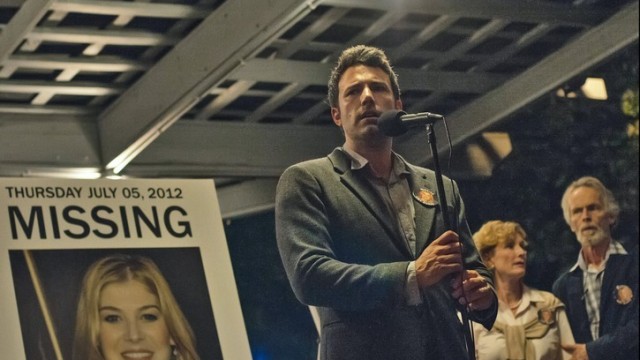My procedure for movies based on books is to not give the literature that inspired the feature a read prior to seeing the film. It’s not that I’m against books in general, it’s just that I want to treat the film as a separate entity as much as possible. Gone Girl adds an interesting facet to this tactic though by having Gillian Flynn, the woman who wrote the book that this movie is based on, write the films screenplay. If her books are anything like this films writing in terms of quality, I’ll be sure to check out any and all of her work ASAP.
The story Flynn concocts here is mesmerizing, the kind of yarn that only gets more enthralling as it continues. That’s both a testament to the high quality writing, and also an effect of the films unique rhythm. At the start of the feature, it fades in and out of shots very quickly, with this speedy technique even being applied to the studio logos. It’s a nice way to mimic the rapid-fire pace of 24 hours news networks, but it just took me a bit to get into it. Once I did however, I was hooked. The films ability to relentlessly toss new plot turns in a manner that doesn’t feel gratuitous is splendidly executed, especially since this tactic is not done at the cost of creating engaging characters.
One such character is played by none other than Ben Affleck. Now, after winning Best Picture in 2013, Affleck has made this leading role in this particular film his first follow-up project after winning that prestigious award. His role is that of Nick Dunne, the protagonist for the film whose wife, Amy Dunne (Rosamund Pike), goes missing. Affleck does an excellent job keeping any given audience on their toes, with the duality of his performance being particularly interesting to watch. However, surpassing even his terrific work is Rosamund Pike. Good Lord, is Pike tremendous in any given scene, with her unexpected performance being riveting constantly riveting, especially in scenes where she interacts with Affleck.
Fincher makes for a more than capable director to handle Flynn’s screenplay, the guy has a knack for making even the smallest scenes feel more interesting, as well as expertly conveying emotion even in seemingly extraneous shots or moments. The combination of the two is like putting sprinkles and ice cream together, it’s that masterful of a pairing. While I felt the entirety of the film was overflowing with tension, I did enjoy how intense and unpredictable things get toward the end, although at the same time this is also the portion of the film where some plot points become a bit too tidy, a bit too convenient for my taste.
Still, that’s one of the few flaws Gone Girl carries; otherwise it’s a spectacular piece of cinema that’s both more funny (Tyler Perry has a ton of humorous lines here. Someone give this guy more dramatic roles, he does great here!) and much more haunting than I excepted. My policy of no spoilers prevents me from talking about some of the films absolute best parts, but perhaps that’s for the best. After all, it matches perfectly with the feature, which has an element of uncertainty that pervades the entire film, even after the credits have stopped.


